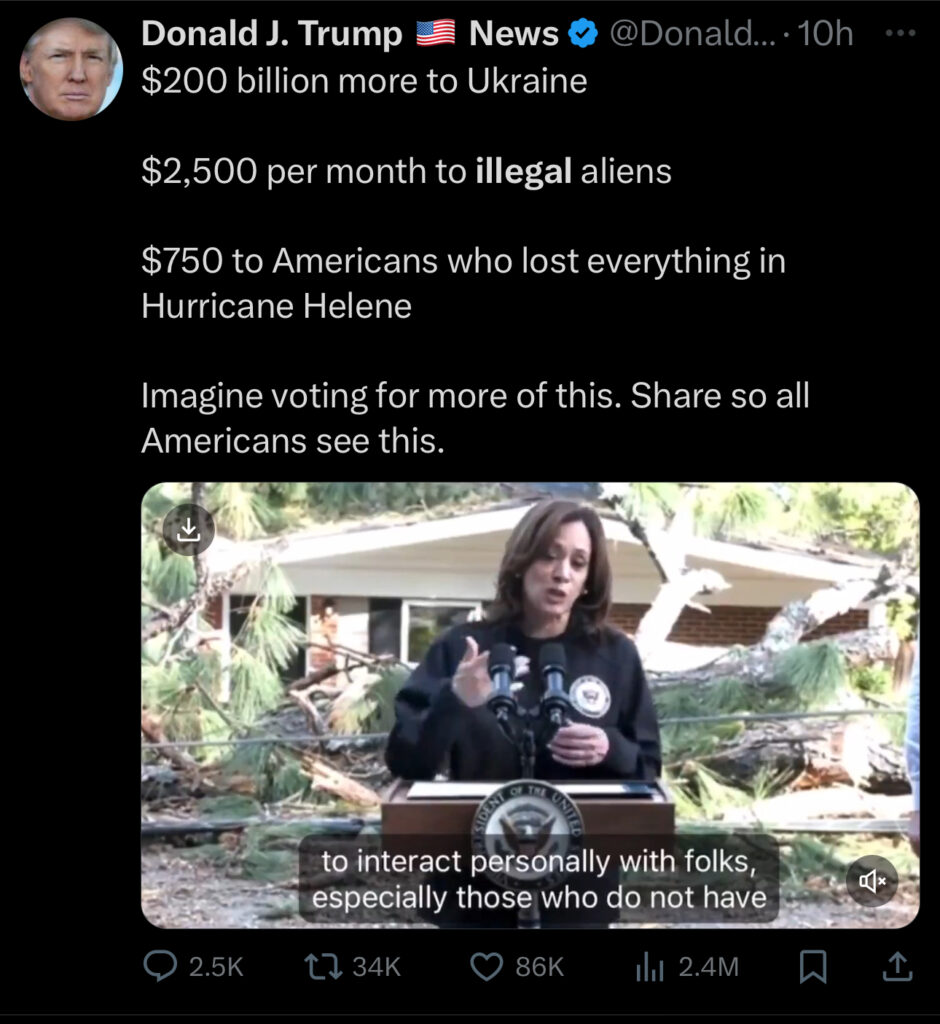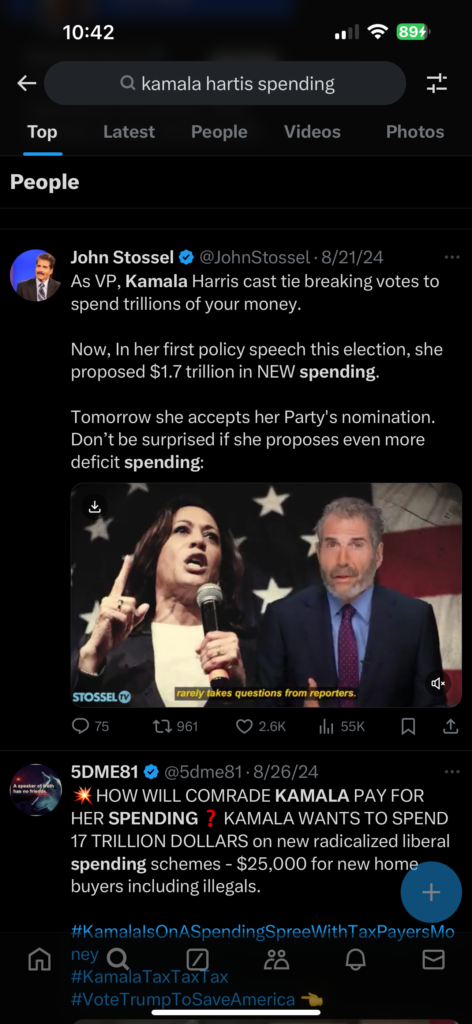Examining Recent Political Claims: Kamala Harris, Government Spending, and Disinformation
In the lead-up to the 2024 election, several politically charged claims have been circulating online, especially on social media, targeting Vice President Kamala Harris, government spending, and fiscal policies under the Biden administration. Posts like those shared by prominent figures have amplified concerns around aid to Ukraine, benefits to undocumented immigrants, and federal disaster relief. Let’s break down some of these claims and see what the facts say.
Summary
As we approach the 2024 election, misinformation is spreading rapidly, targeting Vice President Kamala Harris and government policies. From exaggerated aid figures to misleading claims about benefits to undocumented immigrants, these narratives can easily mislead voters. This blog post dives into some of the most viral claims and separates fact from fiction, helping readers understand what is happening versus what is being claimed. Read on to get the truth behind the headlines and make informed decisions.
Claim 1: “$200 Billion More To Ukraine”

One of the prominent claims is that the Biden-Harris administration is allocating an additional $200 billion in aid to Ukraine. While the U.S. has been a significant contributor to Ukraine’s defense and humanitarian efforts since the start of the war in 2022, the claim of $200 billion is a substantial overstatement.
A recent social media post claimed that the Biden-Harris administration is providing Ukraine with an additional $200 billion in aid. This number is misleading. According to official reports, the total U.S. budget authority for Ukraine-related spending is $175 billion, but only $106 billion is directly allocated as aid to the Ukrainian government, including military, humanitarian, and economic support (Congressional Research Service, 2023; Council on Foreign Relations, 20241).2
The remaining funding is allocated to related U.S. activities and other regional support. This makes the “$200 billion” claim inaccurate, as it does not differentiate between direct aid and other associated expenditures.
It is also essential to understand that neither President Biden nor Vice President Harris has the power to allocate funds for foreign aid unilaterally. All such spending requires congressional approval. The U.S. Constitution grants Congress the authority over federal spending, meaning that any aid package to Ukraine must pass through the House of Representatives and the Senate before being signed into law by the President (U.S. Government Accountability Office, 2023).3
Again, Vice President #Kamala #Harris cannot grant funds, but Congress writes and passes spending bills, according to the Congressional Budget Office. The president can sign or veto these bills but cannot control spending alone.
Source:
https://cbo.gov/topics/budget
Furthermore, the House Committee on Foreign Affairs has been advocating for transparency and effective spending of U.S. assistance, with ongoing congressional oversight to ensure taxpayer funds are used appropriately. Supporting Ukraine has also been framed as part of U.S. national interest, given the importance of countering Russian aggression without risking U.S. military lives (Committee on Foreign Affairs, 2024).4
Claim 2: “$2,500 per month to illegal aliens”
Based on my research, the claim that undocumented immigrants receive $2,500 per month from the U.S. government is false. Federal law, specifically the Personal Responsibility and Work Opportunity Reconciliation Act (PRWORA), prevents undocumented immigrants from receiving most federal public benefits, including welfare and Social Security payments.
Only certain lawfully present non-citizens can qualify for programs such as SNAP or Medicaid, and even then, they must meet stringent eligibility criteria, including a five-year waiting period for many benefits ( Food and Nutrition Service, 2024).5
- However, asylum seekers receive up to assistance, but I could not find anything that says $2,500 exactly.
Programs like the Supplemental Nutrition Assistance Program (SNAP) or Medicaid are only available to U.S. citizens or lawful residents, with few exceptions for emergencies. Refugees with a legal status might receive temporary support during resettlement, but the amounts are modest and do not reach $2,500 per month, as claimed (U.S. Government Accountability Office, 2022).6
Claim 3: “$750 to Americans who lost everything in Hurricane Helene.”
The figure of $750, claimed to be the only financial aid given to Americans affected by Hurricane Helene, is misleading. FEMA provides varied financial assistance depending on the severity of the damage and the victims’ needs. The $750 figure might refer to initial relief payments, but victims often receive more based on their situation, such as housing support, transportation, or food assistance. FEMA relief is also part of a broader disaster response that includes rebuilding funds, temporary housing, and additional federal resources over time (Federal Emergency Management Agency, 2023).7
Claim 4: “$1.7 trillion in new spending and $25,000 for home buyers including illegals”

There have been proposals aimed at helping first-time homebuyers, particularly to address the racial wealth gap and boost homeownership in disadvantaged communities. However, these proposals are intended for U.S. citizens and lawful residents. There is no evidence that these programs include undocumented immigrants (Department of Housing and Urban Development, 2023).8
Based on my findings, some programs assist first-time homebuyers, but none specifically allocate $25,000 exclusively to asylum seekers. The City of Long Beach and the City of Fort Worth offer first-time homebuyer assistance of up to $25,000 to eligible applicants for down payments and closing costs.9
These programs are aimed at low- and moderate-income families to help them purchase homes and build wealth, but they are not explicitly targeted at asylum seekers or undocumented immigrants. Instead, they are available to income-eligible residents who meet the program criteria, including lawful permanent residents and other eligible non-citizens under certain conditions (White House, 2024).
Vice President Harris announced a proposal to provide up to $25,000 to first-generation homebuyers as part of a broader plan to promote homeownership among underrepresented groups. Still, again, this is not specific to asylum seekers, and the funds are intended to help American residents who meet the specified eligibility criteria broadly.10
Conclusion: Disentangling Fact from Disinformation
These claims clearly show how misinformation can spread quickly, especially in the lead-up to a significant election. It is vital for the public to carefully scrutinize the information they encounter and rely on credible sources. Sharing misleading information can create confusion and influence opinions unfairly. Many people need to continue to understand how political systems operate before throwing information and opinions online. I’m still learning myself, let’s avoid dragging VP harris without evidence, facts, statistics and credible sources. My research is just getting started…
Share your thoughts below. Do you disagree? I’m happy to go over the information you find.
References
- Council on Foreign Relations. (2024). How much U.S. aid is going to Ukraine? Council on Foreign Relations. https://www.cfr.org/article/how-much-us-aid-going-ukraine ↩︎
- Congressional Research Service. (2023). U.S. foreign aid to Ukraine: An overview. Congressional Research Service. https://crsreports.congress.gov/ ↩︎
- U.S. Government Accountability Office. (2022). Fiscal Year 2023 Budget Request: U.S. Government Accountability Office (GAO-22-900396). GAO. Retrieved from https://www.gao.gov. ↩︎
- Committee on Foreign Affairs. (2024). Russia/Ukraine – Committee on Foreign Affairs. House Foreign Affairs. https://foreignaffairs.house.gov/russia-ukraine/ ↩︎
- U.S. Department of Agriculture. (2024). SNAP eligibility for non-citizens. Food and Nutrition Service. Retrieved from https://www.fns.usda.gov/snap/eligibility/non-citizens ↩︎
- U.S. Government Accountability Office. (2022). Fiscal Year 2023 Budget Request: U.S. Government Accountability Office. GAO-22-900396. https://www.gao.gov ↩︎
- Federal Emergency Management Agency. (2023). Disaster assistance program overview. Federal Emergency Management Agency. https://www.fema.gov/assistance/individual ↩︎
- U.S. Department of Homeland Security. (2023). Eligibility for federal public benefits. U.S. Department of Homeland Security. https://www.dhs.gov/immigration-statistics ↩︎
- City of Long Beach. (2024). First-time homebuyer assistance program. City of Long Beach Community Development. Retrieved from https://www.longbeach.gov/lbhomegrant ↩︎
- The White House. (2024, June 26). Press call by Vice President Harris announcing new action on housing. The White House. Retrieved from https://www.whitehouse.gov/briefing-room/statements-releases/2024/06/26/press-call-by-vice-president-harris-announcing-new-action-on-housing/ ↩︎






Leave a Reply